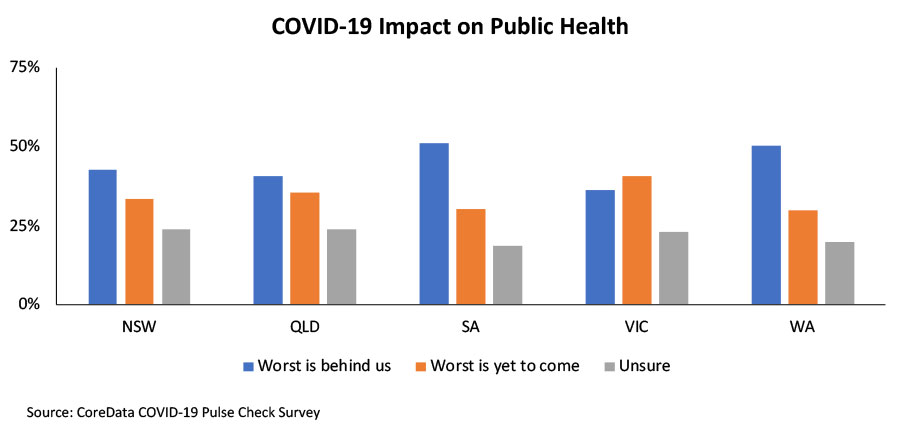While some Australians consider the worst of the public health crisis to be over, those in the hardest-hit states on the Eastern seaboard are more pessimistic about the economic recovery.
As states move to relax social distancing restrictions, CoreData’s COVID-19 Pulse Check reveals how Australians’ attitudes and experiences differ by their place of residence.
According to our research, nearly two in five (38.9 per cent) Australians have suffered loss of income, and almost one in two (47.5 per cent) are expecting the impact on their financial situation to last up to 12 months, or longer.
The numbers are highest in Victoria, where more than two in five (43.6 per cent) have lost income, and one in 10 have been unable to pay household bills (13.6 per cent) or pay for essential items (11.4 per cent).
Queensland tells a similar story, where more than one in three (36.5 per cent) report being in a financial position that is vulnerable to, or already experiencing, financial hardship. Here, one in four (25.2 per cent) are already seeking additional work, and one in eight (12.4 per cent) have needed to draw on their retirement savings.
Hope for an economic recovery
With unemployment tipped by Treasury to hit 10% in the June quarter, more than two-thirds (70.2 per cent) of Australians are expecting the country to enter a recession in the next year. However, the diverse drivers of the respective state economies likely mean that an Australian will experience a different year ahead dependent on where they live.
In mining reliant states like Western Australia and South Australia, the sector’s ability to sustain operations throughout the pandemic has boosted economic optimism. One in five in Western Australians (22.7 per cent) and South Australians (20.1 per cent) think that the worst of the COVID-19 impact on the Australian economy is behind us, compared to less than one in six (14.5 per cent) across the other mainland states.
In Victoria (73.2 per cent) and Queensland (71.5 per cent), almost three-quarters of residents think the worst is yet to come for the local economy.
In WA, where commodities significantly dominate value added, just one in six (17.2 per cent) say they are worried about potential job loss, compared to more than one in four (26.3 per cent) across the other mainland states.
The relative resilience of the commodity sector has enabled West Aussies to feel surer of their financial position, with two in five (40.1 per cent) reporting feeling financially secure, above the mainland state average of 37.7 per cent. Similarly, fewer say they have applied for financial support or sought additional work.

Although most of the credit should be given to state governments, the data suggests attitudes towards the Federal Government’s response also vary by state. In WA, where community spread has long been contained, almost four in five (79.7 per cent) approve of the actions taken by the Federal Government, labelling them as good or excellent. In NSW, the state with the highest number of infections, approval remains high but falls to closer to two-thirds (68.8 per cent).
The outlook for public health reflects the outlook for the economy, with Western Australians (50.2 per cent) and South Australians (50.9 per cent) more likely than the average person across the mainland states (42.0 per cent) to think that we have already seen the worst of COVID-19’s impact on public health.
Less suffering and more happiness in the West
The year so far has undoubtedly been tough on all Australians, with most of us experiencing adverse impacts on our mental health and general wellbeing.
However, West Aussies appear to have taken less of a knock, with only two in five (40.6 per cent) saying that the virus has negatively impacted their overall wellbeing, compared to one in two across the other mainland states (49.3 per cent).
Subsequently, more West Aussies are feeling positive, with nearly one in three (32.0 per cent) reporting feeling happy; slightly above the average South Australian (28.9 per cent) and the other mainland states (25.4 per cent). In Victoria, almost one in three (31.2 per cent) are feeling anxious, and in Queensland one in 10 (10.3 per cent) report feeling depressed.
Whilst the Prime Minister is adamant that the nation is in this fight together, the reality is that each state will likely chart a different course throughout the lifespan of the pandemic. Those in areas where infections spike will suffer worse economic outcomes, while those in states that progressively get back to ‘normal’ will be better able to return to the living standard they once enjoyed.

